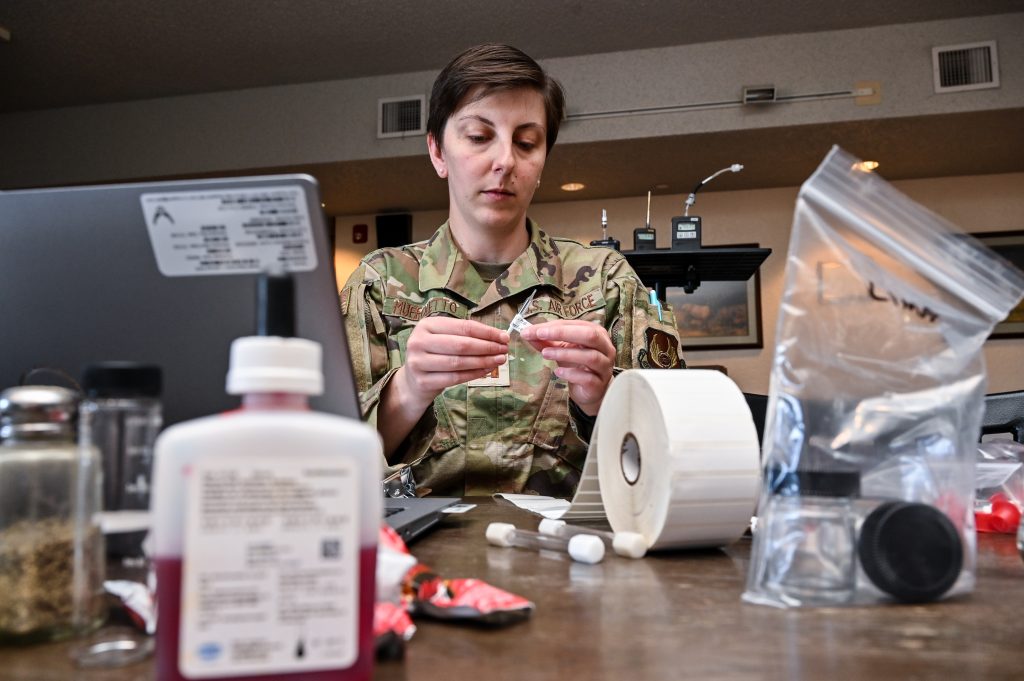The Air Force found increased rates of breast and prostate cancers in service members who worked on nuclear intercontinental ballistic missiles compared to the general population, according to a preliminary study of data publicly released on March 13.
“What we don’t know is whether these rates specifically for breast and prostate are due to increased screening or access to care or whether these are due to unique military exposures,” Col. Tory Woodard, a doctor and the head of U.S. Air Force School of Aerospace Medicine (USAFSAM), said in remarks at a Feb. 23 town hall, according to Air Force Global Strike Command, which maintains the nation’s 400-plus land-based strategic missiles.
The Air Force is in the midst of a wide-ranging Missile Community Cancer Study, sparked by renewed concerns that surfaced in early 2023 of possible increased cases of non-Hodgkin Lymphoma, a blood cancer, at Malmstrom Air Force Base, Mont. The service previously dismissed those concerns in 2001 and 2005 reviews.
The newly analyzed data does not show increased rates of non-Hodgkin lymphoma, the specific cancer that sparked the new study.
Missileers and other personnel working on decades-old Minuteman III missiles and older systems have long had health concerns related to their service, which often require them to work in underground bunkers for 24-48 hours at a time. Security personnel, maintainers, and other individuals also worked at ICBM sites.
Air Force officials cautioned that the information was preliminary and drawn from a limited dataset of around 2 million military personnel, with a focus on 84,000 “missile community members” who were around ICBM facilities, including 8,000 missileers.
The data only includes Department of Defense electronic medical records from 2001-2021, capturing those who were diagnosed with cancer through the Military Health System (MHS), including through the Tricare health insurance program. Cases outside the Military Health System were not included in the analysis.
For the initial phase, the military was “unable to determine cancer cases diagnosed prior to 2001 or outside of the MHS/TRICARE,” Woodard wrote in a March 6 memo. The Air Force anticipates the initial data makes up fewer than 25 percent of the total cancer cases that make be captured during the study.
“What is important to understand is that the epidemiology study is still nascent but progressing to eventually deliver responsible data to draw conclusions from at the end of the study,” an AFGSC spokesperson said.
The results were presented during the town hall held by Air Force Global Strike Command boss Gen. Thomas A. Bussiere, along with medical experts from USAFSAM and AFGSC. USAFSAM is leading the Missile Community Cancer Study, which has been ongoing for the past year.

Comparisons of cancer rates between the ICBM community and the general population are “difficult at this time due to incomplete case counts within this data set,” read a slide presented during the town hall.
Subsequent phases of the study promise to include data from the Veterans Administration’s cancer registry dating back to 1976, death certificates dating back to 1979, DOD cancer registry data dating back to 1986, and those diagnosed in the VA system dating back to 1991, along with data from state and other cancer registries.
That data is expected to come this summer, according to the Air Force. That review will also include data on personnel from bases that no longer have an active ICBM mission, the service says. The study team is also considering conducting a study of reproductive health in the missile community.
“We have five other data sets to study, and each additional data set will build our knowledge base and help to shape the larger picture,” Woodard said. “That picture will not be complete until we complete all phases of this Epidemiology Review.”
Breast and prostate cancers have long been a concern for service members in all fields and services, according to a 2023 study published in the American Cancer Society’s medical journal. The study’s authors analyzed cancer data for service members and found “higher rates of prostate and breast cancers, particularly in 40- to 59-year-olds” compared to the general population. However, the study authors did not say military service was the definitive cause of the cancers and “may result from greater cancer screening utilization or cumulative military exposures.”
Doctors from USAFSAM also led a study of Air Force pilots published in 2021 that found that “compared with the U.S. population, male fighter aviators were more likely to develop and die from melanoma skin cancer, prostate cancer, and non-Hodgkin lymphoma.”
The Missile Community Cancer Study is also conducting environmental sampling of ICBM facilities. All three active ICBM bases—Malmstrom, F.E. Warren, and Minot air force bases, with Minuteman III fields spread out over Montana, Wyoming, North Dakota, Colorado, and Nebraska—show “air, water, & soil samples below acceptable regulatory levels for any chemicals or hazards,” according to a slide presented at the town hall.
Toxic chemicals known as polychlorinated biphenyls (PCB) were found in some isolated places at those bases, but AFGSC says those facilities are in the process of being cleaned and made safe or have already reopened. The production of PCBs were banned in the United States in 1979, and Air Force officials said the removal process began in the 1980s.
It is unclear how long and at what level the PCBs were present before the current mitigation efforts. The study team recently finished environmental sampling at Vandenberg Space Force Base, the Minuteman III test launch facility, but the Air Force says it has not yet received results.
“There remains a significant level of interest and engagement,” Bussiere said at the town hall. “I ask that you be persistent in highlighting areas that need to be highlighted to help us to get things right, but that you also be patient because there is still a lot to be done.”
